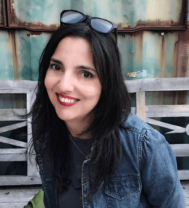I have spent a lot of time standing before people sharing my story about living with diabetes. Whether it be my diagnosis story, experience of using the healthcare system, my diabetes and pregnancy story, tales of particular challenges or successes, I have been asked to be the case study for a variety of audiences including healthcare professionals, those responsible for determining health policy, for media interviews and the general public , as well as on advisory boards and steering committees.
I am, quite frankly, the expert person with diabetes…as long as that person with diabetes is a forty-something year old white women living in Melbourne, diagnosed with type 1 diabetes as a twenty-four year old, who wears a lot of different diabetes devices strapped to her body, is happily bolshy about telling people what I need, and more than ready to overshare at the drop of a hat. If that’s the diabetes story you want to hear, you can find me here, because, in the words (almost) of Carly Simon, nobody does it better (than me).
But if you want to hear the story of any other person with diabetes, particularly those whose experiences are wildly (or even moderately) divergent from mine, I am not the right person for the job. I can’t explain what it’s like to have struggles navigating the health system or what it is like to have difficulties to be heard and understood because I don’t speak the language of the HCPs treating me. I don’t for a moment understand how it is to try to manage my diabetes if no one is aware or sensitive to cultural practises that impact on my management. And I have no idea how BIPOC with diabetes experience health care, and how the bias from discrimination plays out in a real-life setting. If that’s what you’re looking for, there are many, many who tell that story far better than me.
Sometimes, it’s easy to know when I have not been the right person with diabetes to be involved in a project. I was once asked to sit on a project committee that was looking at developing a new program for men diagnosed with type 2 diabetes in their sixties living with erectile dysfunction. The project committee decided they needed a ‘real person with diabetes’ to be part of their advisory board, and hoped I’d be interested. I pointed out that I fit literally none of the characteristics of the program’s ‘end user’ and suggested that they search for someone who was far more relevant to the work, rather than someone who did no more than tick the just the ‘token person with diabetes’ box.
In almost twenty years of working in diabetes advocacy, there has been a thread that has woven its way through my work. It can be summed up in five words: ‘Nothing about us without us’. People with diabetes are the ‘us’ in this phrase, and anything that is being delivered, developed, offered to us should involve us from the get-go and all the way through the process. When we hear presentations about any aspect of diabetes, I believe that PWDs have a place on that stage alongside researchers, clinicians and academics. In fact, I have been known to introduce myself when I have been included in such a panel as ‘the most important person in the room’.
While I appreciate – and am grateful for – these opportunities when I have been asked to be the ‘here’s one we prepared earlier’, or sit in the audience and watch someone else take on that role, there is an undeniable and somewhat uncomfortable truth. All the people look very much like me, and have stories similar to my own.
And those stories, while just as legitimate as anyone else’s, are often missing a lot of important experiences. White, middle class, urban tales of diabetes in a well-resourced country (such as my own) are given a disproportionate space in the ‘patient stories’ space, and I realise now that I have not done enough to work to make sure that those stories were from people not like me and to find a way to diversity in the lived experience presented.
One of my favourite diabetes advocates, Chelcie Rice, says that if we are not offered a seat at the table, we should bring our own folding chair. I understand that sentiment, because I feel that I have been dragging a chair with me to pretty much every single table I have sat at. But that is not enough. I should have brought a second chair with me, and looked around the table to make sure the person on that spare chair had a story vastly different to mine; that their challenges don’t mirror my own; that they can provide a perspective I know nothing about.
And I also see my role as being quiet while they speak. I have had my turn, and I will only continue to have it now when there are others there too who have different stories to tell – stories from voices that we simply have not heard enough in the past.



